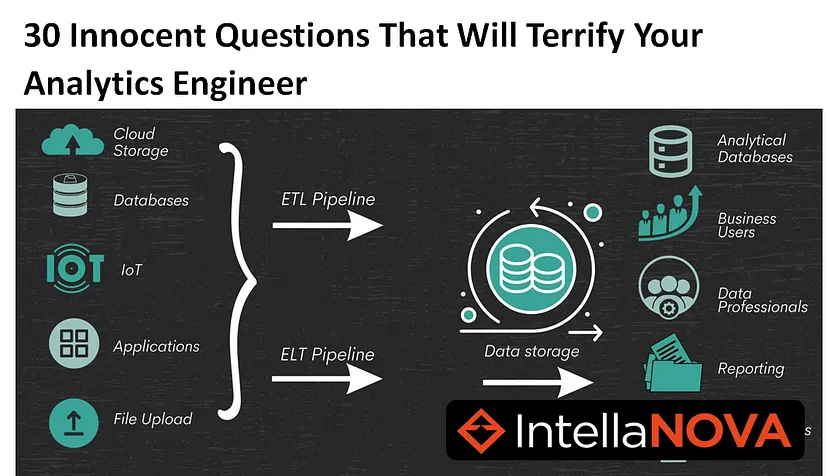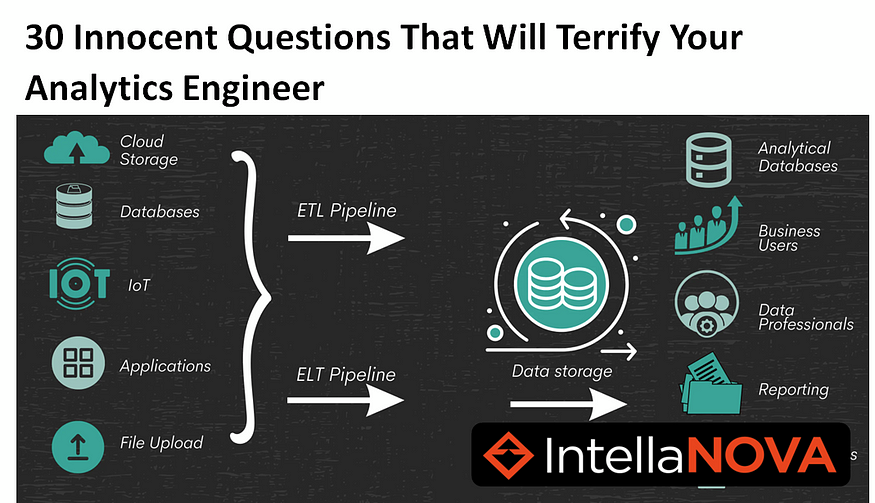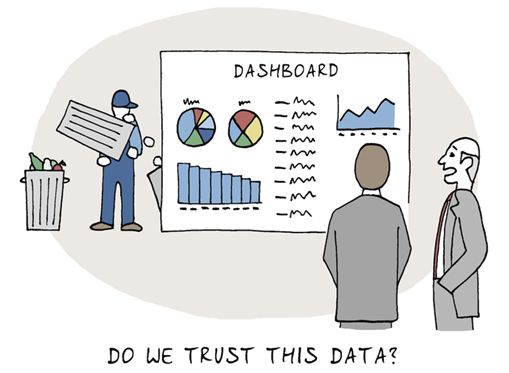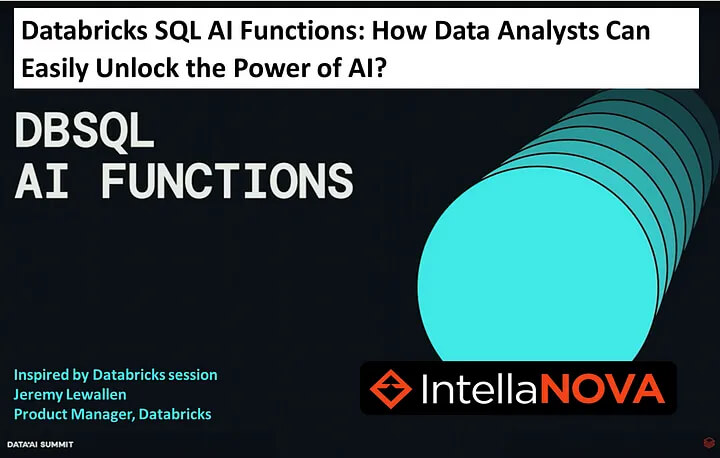
30 Innocent Questions That Will Terrify Your Analytics Engineer
“We’ve changed the way we calculate ‘active users,’ but that shouldn’t affect your reports, right?”
Translation: Expect to find entirely new metrics that make no sense next to the old ones.
“Could you add a bunch of filters to the dashboard? It should be simple.”
Translation: “Simple” is a relative term — get ready for logic puzzles galore.

“Can you make this dashboard update in real-time?”
Translation: I’ll need you to bend the laws of time and ETL.
“Can you just pull the data directly from the production database?”
Translation: What could go wrong with querying sensitive, high-traffic data in real time?
“The record count isn’t matching before and after adding a new column!”
Translation: Time for a full audit.
“Just ignore those error messages. They don’t mean anything.”
Translation: Famous last words before something critical breaks.

“Remind me, what is it that you do again?”
Translation: I’m about to delegate a huge data issue to you with zero context.
“We changed tables and data types at the source, but it shouldn’t affect anything, right?”
Translation: Nothing like a surprise schema shift to start your day.
“We need a quick breakdown of last quarter’s data by every imaginable slice.”
Translation: A simple request that will unravel into 50 complex pivot tables.
“Source table contains duplicated rows, but their primary keys are unique.”
Translation: A mystery wrapped in a conundrum with no easy fix.
“Hey, I changed a few columns in the data model. It shouldn’t affect anything, right?”
Translation: Prepare for cascading chaos in every dependent model.
“Can I create a model with a monotonically increasing integer key?”
Translation: I’m hoping for a simple key, but this may not go well…
“The business team needs this complex analysis by tomorrow morning.”
Translation: You’ll be spending your night staring at SQL joins.
“The data pipeline went down, and there’s no backup!”
Translation: Weeks of work vanished. Time to rebuild from scratch.

“We’re moving to a new data warehouse solution. The migration consultants assure us there will be zero downtime.”
Translation: Famous last words.
“I added a new data source from the web. We’ll clean up the duplicates later.”
Translation: Hello, data quality issues and irregular format nightmares.
“I thought we hired you to be a data scientist.”
Translation: Your title doesn’t matter; you’re about to wear every data hat.
“We’re moving our data warehouse to MongoDB from PostgreSQL.”
Translation: Structured schema? Consistency? Good luck.
“Is there a way to undo the last migration? We might have lost some rows.”
Translation: “Undo” in a database is like unscrambling an egg.

“We need a historical data refresh for every table. How long could that take?”
Translation: Longer than anyone has patience for.
“The source system underwent an update. But don’t worry, they didn’t change much.”
Translation: Brace for unexpected data structure surprises.
“Go faster — forget tests and merge everything straight to production.”
Translation: Production-first, disaster-later.
“Why are these results inconsistent across dashboards?”
Translation: Prepare to track down ghostly discrepancies in SQL logic.

“Can you optimize the entire ETL process without adding any new infrastructure?”
Translation: Let’s break the laws of computing and physics.
“Why can’t we just run that complex query directly in production?”
Translation: How many ways can I say “deadlock” and “system slowdown”?
“Can you do some ad-hoc analysis on that abandoned, undocumented legacy table?”
Translation: Archaeology meets data analysis.
“The report needs to be accurate, up-to-the-second, and include historical analysis too.”
Translation: Real-time analytics plus deep historical context — no pressure.
“Can you track changes on this live dashboard for every user’s session?”
Translation: We need to defy the laws of analytics and deliver per-user tracking on demand.
“We have some raw Excel sheets for you — can you pull insights out of them?”
Translation: Get ready to fight against CSV, misaligned cells, and chaos
“We need to merge data across five systems, none of which have consistent schemas.”
Translation: Forget cohesive data joins; we’re assembling a data jigsaw puzzle.
These remarks will scare any analytics engineer. So the next time you’re talking to one, then just remember one thing.
“Small changes in the data world can lead to big consequences. Hence, a bit of clarity can save countless hours of debugging.”



